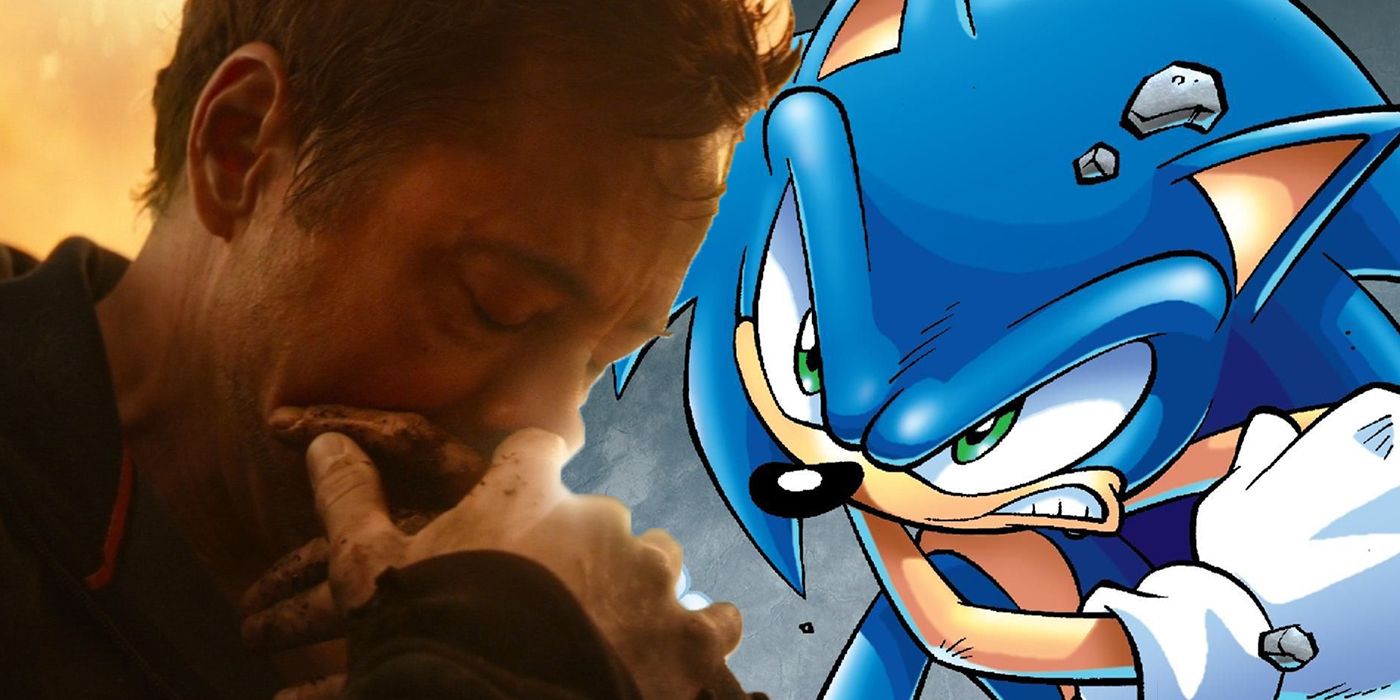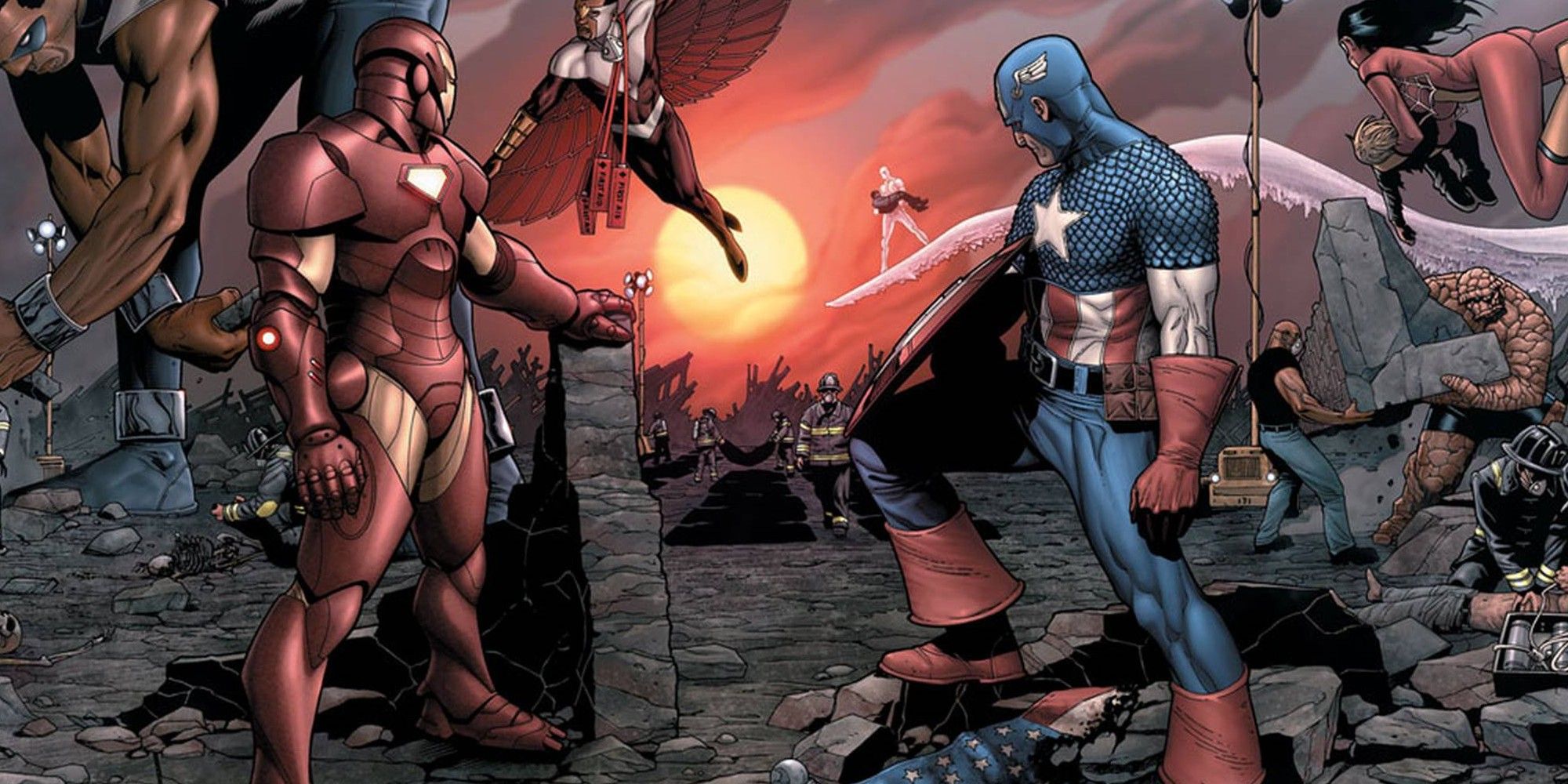Due to the level of their severity, the ethicality of Iron Man’s methods during the Civil War limited series and most especially, the Contest of Champions alternative event, are questionable at best and shake the very foundations of Tony Stark’s claim and status as a superhero. But comparing these incidents with the strong moral fiber and heroic tendencies that IDW Publishing’s Sonic the Hedgehog displays during the Fate of Dr. Eggman arc in spite of the ethical dilemmas he faces proves that true heroes can always take a more ethical approach no matter the circumstances.
Iron Man might have to contend with former friends and allies opposing a new law that he feels is necessary to protect innocent lives, but Sonic finds himself in a more morally questionable predicament. Sonic has to put aside his past struggles with his arch-nemesis Dr. Eggman (who imprisoned him during the entirety of the Eggman War while trying to murder and enslave his friends) and then not only defend the villain's honor but physically protect him from harm.
But what would compel Sonic to stand up for his former enemy? It’s because Dr. Eggman doesn’t know who he is. Instead, he thinks his name is Mr. Tinker and knows for a fact that he enjoys helping the critters he had once tried to destroy. Rather than create weapons of mass destruction, he's repaired a child’s wagon, sewed together a teddy bear, fixed a pocket watch, made a non-functioning windmill spin again, created a barricade to protect his friends during a badniks invasion (that he helped create when he was still Dr. Eggman) and even repaired the cell that he was actually imprisoned in to keep him and other prisoners behind bars. He has also enjoyed wearing a hat of flowers. To this day, IDW Publishing hasn’t revealed why Dr. Eggman succumbed to amnesia, but it’s clear that when the Eggman War ended (right before the series begins), that he went missing, and when he returned he forgot who he was. It would later take Dr. Eggman’s apprentice Dr. Starline to electrocute the villain through special goggles and use neuro-stimulants and aggressive hypnotherapy three times for him to finally remember his true identity.
When Sonic first meets Dr. Eggman as Mr. Tinker, the blue hedgehog is understandably skeptical and soon finds himself debating with his friends on whether you can punish someone for doing things that the person in question doesn’t remember doing. Eventually, Sonic (the real hero that he is) concludes that he can’t in all conscience do so and even goes so far as to prevent other people from trying to punish him. When Shadow the Hedgehog comes to take down the former mad scientist, Sonic physically gets in the way numerous times before throwing him into the side of a house in an attempt to end the onslaught. Their confrontation later escalates into a race/fight, during which Sonic tries to reason with Shadow by bringing up the times that Dr. Eggman had helped them in the past. Sonic finally gets to Shadow by pointing out the black hedgehog's own past: Shadow had once tried to kill Sonic and even to destroy an entire planet, and if Dr. Eggman can’t be forgiven then why should Sonic forgive Shadow?
In the Marvel universe’s Civil War series, a new group of superheroes accidentally kills more than 600 people including school children. This understandably traumatizes Iron Man and compels him to help Congress pass the Superhuman Registration Act that requires superheroes to register and train with the government if they wish to continue serving as superheroes. The problem is that the new act would require superheroes in compliance with the law to hunt superheroes down who are in violation of the act. Captain America understandably defects from the Avengers and forms the Secret Avengers who will continue fighting crime as they had done before without registering with the government. Unlike Sonic, Iron Man oversees and partakes in some heinous acts, including an attack on Captain America before the law has been passed (i.e. enacting violence on a citizen for committing an act that is not yet illegal), fraternizing with mass murderers by employing them to hunt down superheroes not in compliance with his law and fighting the Secret Avengers on three separate occasions, which results in the death of superheroes.
By the time the act passes and fighting against the Secret Avengers is legal, Stark faces an ethical dilemma similar to what Sonic contends with. Captain America and his Secret Avengers are still doing good things by fighting bad guys (like how Dr. Eggman is now a helpful citizen as Mr. Tinker), but they are wrong for violating the law (like how Mr. Tinker is actually Dr. Eggman and has committed horrific crimes against the world). Stark might be on the right side of the law, but he chooses to resort to violence against his friends who aren’t evil, which is, arguably, not very heroic. Conversely, Sonic adopts a more heroic course of action by not committing violence against someone who is arguably the very embodiment of evil (which is what usually legitimizes the utilization of excessive force).
Iron Man’s decisions move him closer into anti-hero territory (and possibly the realm of villainy) where ethically reprehensible behavior is more accepted in 2015's Contest of Champions series where an alternate version of Civil War plays out in Stark’s favor. Basically, Maestro tricks the Mighty Avengers into fighting who they think are unregistered vigilantes on Earth, which results in them splitting into three teams. But when two superheroes are killed accidentally, the teams begin combatting each other, an unpleasant scenario that leads to Stark actually killing his friend and comrade Captain America. On top of this, Iron Man has the audacity to use the Reality Gem from the Infinity Gauntlet to alter the events of Civil War in his favor and to rig the presidential election.
Meanwhile, Sonic the Hedgehog ends up working with Dr. Eggman (and temporarily losing his mind) even after Mr. Tinker regains his memories and tries to destroy the world with the Metal Virus - which infects Sonic. Despite feeling responsible for protecting Mr. Tinker who is destroying the world as a result of his kindness, Sonic once more taps into his seemingly interminable heroic well and works with Dr. Eggman to stop both a raging Metal Virus that he had lost control over and a fabled race of demons who are taking advantage of the chaos from the Metal Virus to rule the world. Of course, it’s Dr. Eggman’s idea that saves the day. Sonic just has to carry it out like the hero he is.



